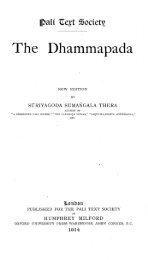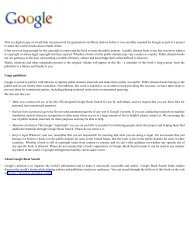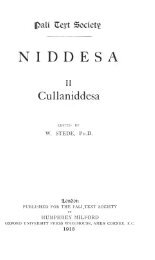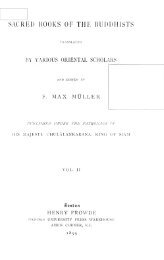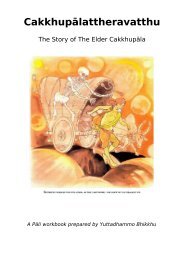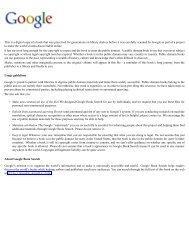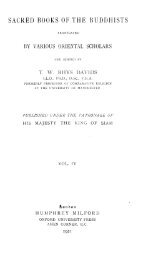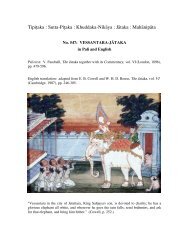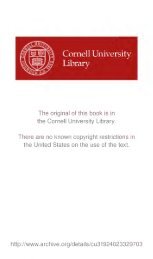Lessons In Practical Buddhism - Sirimangalo.Org
Lessons In Practical Buddhism - Sirimangalo.Org
Lessons In Practical Buddhism - Sirimangalo.Org
You also want an ePaper? Increase the reach of your titles
YUMPU automatically turns print PDFs into web optimized ePapers that Google loves.
from external interruption.<br />
One of the most comprehensive teachings given by the<br />
Buddha on practical development of empirical insight is<br />
found in the Sabbāsava Sutta, the discourse on “all of the<br />
taints”, or “all of the defilements”. This sutta is of great<br />
benefit even for new Buddhist practitioners, since it explains<br />
all of the various ways of removing unwholesome habits from<br />
the mind. As the title suggests, it claims to provide a<br />
comprehensive practice for ridding one’s mind of all<br />
channels by which unwholesomeness, and therefore<br />
suffering, might arise. This discourse, the second sutta in<br />
the Majjhima Nikāya, is recommended reading for all<br />
Buddhists serious in undertaking practice of the Buddha’s<br />
teaching in order to realize enlightenment for themselves,<br />
rather than just worshipping or venerating the Buddha as<br />
one who himself practised rightly.<br />
<strong>In</strong> this sutta, the Buddha explained seven practices that are<br />
intrinsically important in mental development, including but<br />
not limited to the meditation practice itself. These seven<br />
practices form a comprehensive practice, providing one with<br />
the ability to conquer any and all mental defilements that<br />
exist in the mind. For those approaching the Buddha’s<br />
teaching for the first time, it is also useful in providing a<br />
comprehensive understanding of the Buddha’s teaching as<br />
taught by the Buddha himself. By studying this teaching,<br />
one will see that the Buddha did indeed give instruction in all<br />
aspects of spiritual development, leaving out nothing of<br />
importance to the cultivation of the spiritual path.<br />
The subject of the discourse is how to rid oneself of the taints<br />
(āsava) – those qualities of mind that cause one to act or<br />
speak in a way contrary to one’s own best interest; the<br />
unwholesome tendencies and misunderstandings that exist<br />
in the mind and give rise to suffering for ourselves and for<br />
other beings. <strong>In</strong> <strong>Buddhism</strong> these are considered to be the<br />
only true source of suffering; <strong>Buddhism</strong> denies the belief that<br />
suffering can be caused by another. Even when we cause<br />
suffering for other people, it is understood that it is ourselves<br />
who will suffer from our own actions, due to subsequent<br />
feelings of guilt, anger, fear, worry, etc. – the person we hurt<br />
can only suffer if they react to our actions negatively.<br />
27



